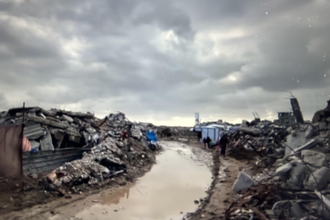Aid agencies respond to UK International Development White Paper
Today, the UK Government has published its UK International Development White Paper entitled 'International development in a contested world ending extreme poverty and tacking climate change' - it's first since 2009. Aid agencies have welcomed the Paper, but expressed concerns that it does not go far enough.
SCIAF (Scottish International Catholic Aid Fund) "cautiously welcomes the UK Government's White Paper on International Development as a positive shift, acknowledging its renewed focus on global challenges. However, the organisation expresses significant concerns about the paper's limitations, particularly in addressing Loss and Damage.
"With COP28 approaching, SCIAF asserts that the paper, while a step forward, lacks the transformative ambition needed for the UK to genuinely combat global injustice."
Ben Wilson, Head of Advocacy said: "The White Paper represents a very welcome u-turn from the UK Government on international development. The FCDO has clearly put a huge amount of work into setting out this new vision and rightly, the new Foreign Secretary is setting out an ambition for the UK to recover its tarnished global reputation.
"We also welcome the commitments to redouble efforts on the Sustainable Development Goals (SDGs), reform global institutions, target aid to the most marginalised and the emphasis on two-way respectful partnerships.
"But there is a lot that is missing. The paper fails to set out the full scale of reforms needed to challenge the unjust structures which perpetuate global inequality.
Much more is needed on debt cancellation, cracking down on tax evasion and global trade reform. Ultimately, we need a return to our legally binding 0.7% commitments to aid, and to find new money by taxing polluters to pay for their climate damages.
"With COP28 just ten days away, it is a huge disappointment that there is nothing in this paper about the crucial issue of Loss and Damage.
"This is a step in the right direction, but falls far short of the scale of ambition needed for the UK to genuinely play a transformational role in tackling global injustice across the world."
Neil Thorns, Director of Advocacy at CAFOD, said: "The Government's White Paper today is a welcome shift of direction in many area - but there is still work to do. The commitment to ending extreme poverty, tackling climate change and delivering over half of UK aid to the lowest income countries is welcomed, and especially timely as we approach COP28.
"Equally, the UK's move to actively partner globally within the multilateral system and to increase the voice of low-income countries is a positive step. The commitment to listen and support local organisations is very welcome as we know it's often those local faith groups who are first responders in a crisis. Time and again the international aid system has failed to recognise or support their efforts.
"It is encouraging to see the Government acknowledging the need to urgently scale-up funding and address the scale of unsustainable debts in some countries. We hope following its publication there will be a chance to act boldly through legislation to force private creditors to participate in debt relief. This is critical, as these creditors are still holding out and taking payments from countries in Africa, whose governments are struggling to respond to the climate crisis or fund health and social services.
"While commitment to 'strengthened co-ordination and locally-led action to transform the food system' is welcome, the white paper lacks an overall strategy for food systems transformation. The focus on new technologies and innovation potentially misses the needs of smallholder farmers, particularly seed technologies and genomics. Any new policy frameworks must ensure these farmers can participate in developing, and can access, useful technologies.
"Finally, while we welcome the future focus of BII, the UK's development finance institution, on low-income countries and increased transparency, we sincerely hope this will pave the way to re-considering the 20% of BII's investments which are currently in fossil fuels."
Christian Aid's Chief Executive Patrick Watt said: "Recent decades have seen remarkable progress in tackling global poverty. But entrenched inequality has slowed that progress and the climate crisis and conflict threaten to throw it into reverse. Eradicating poverty and tackling the climate crisis requires fresh approaches.
"At Christian Aid, drawing on our long experience with local partners, we strongly welcome the intention to invest more in locally-led approaches and to do more to champion the greater representation of low-income countries in global decision-making.
"However, the ambition of Ministers falls far short in far too many areas, most notably on the lack of commitment to legislation to address the global debt crisis.
"Without mobilising more public finance through debt cancellation, through tackling the broken global tax system, and through restoring the aid budget then the good intentions of the White Paper cannot be realised."
LINKS
Read the White Paper HERE
SCIAF: www.sciaf.org.uk/
CAFOD: https://cafod.org.uk/
Christian Aid: www.christianaid.org.uk


















